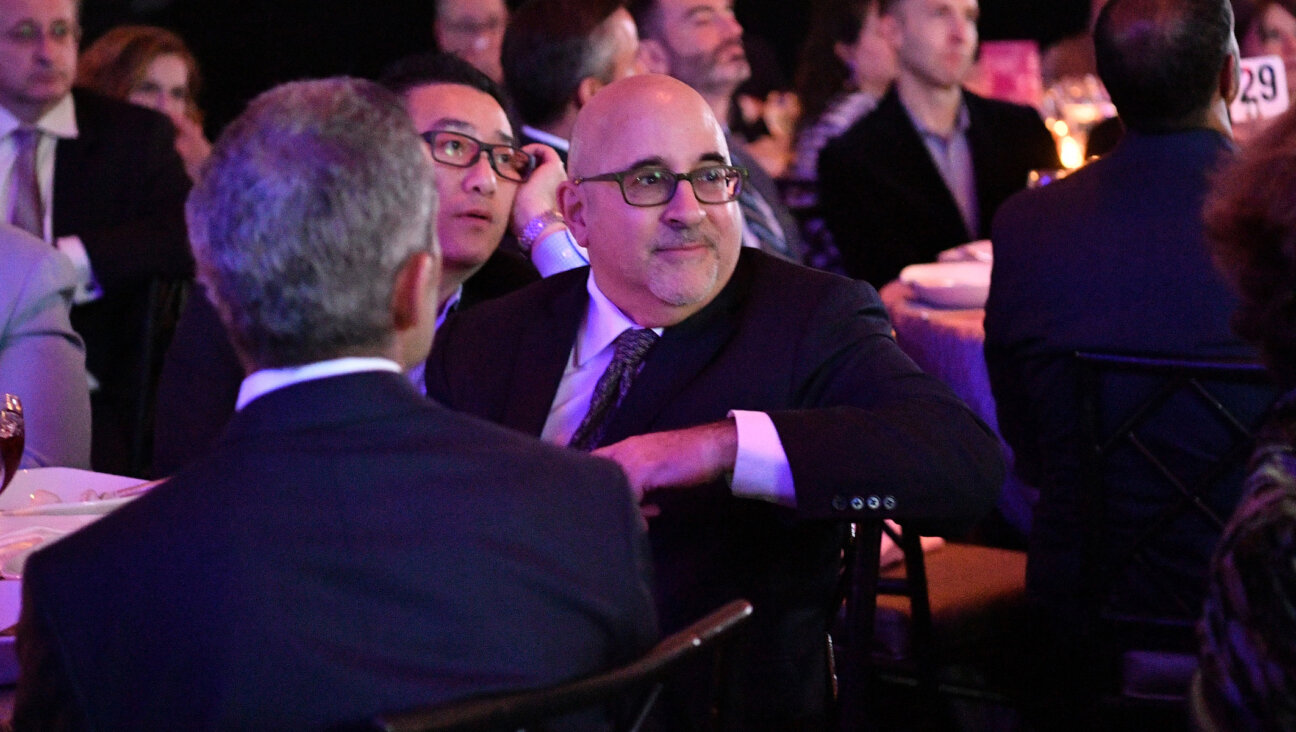A Tale of Two Brothers

A Complex Place: A Purim festival in the streets of Tel Aviv in March presents Israel as a more dynamic, diverse place than it is in the American Jewish imagination. Image by Getty Images
If you’ve felt embarrassed by Israel lately, what follows might really offend you. But first, a parable.
Two brothers live on distant continents. Aaron, the elder, makes a good living as a corporate lawyer, finding fulfillment in his family and hobbies. Joshua, the younger, chose a much harder path as a novelist, chasing an artistic dream and making mistakes along the way. Their relationship is one of mutual love, but also of envy: Aaron always envied Joshua’s romantic, meaningful struggle; Joshua envied Aaron’s stability, normalcy and wealth.
Joshua’s books are controversial. Loved by some, hated by others, he is known around the world. And his life is complicated. He smokes to battle stress and maintain his creative edge. Often in debt, he has had to take odd jobs, and rely on Aaron’s generosity, to survive.
One day, Joshua is falsely accused of plagiarism by a jealous former classmate — an accusation that makes headlines in Aaron’s country. Joshua’s career is in danger, and he needs Aaron’s support more than ever.
Yet over the years, their separation has strained the relationship. Aaron has never had time to read Joshua’s novels himself, and though he has always taken pride in his brother, he’s discomfited by Joshua’s lifestyle and reputation. They don’t talk much. Without their noticing, a wedge of alienation has driven them apart.
With the plagiarism scandal, Aaron has had enough. It doesn’t matter that Joshua is innocent; Aaron’s own business has been hit hard by a faltering economy, and his brother’s scandals have made things worse. Interviewed on national television, Aaron says he’s “embarrassed” by his younger brother. Joshua is shocked by the betrayal — it is he, after all, who’s fighting for his professional life. Aaron, however, is sick of Joshua’s miscues. They never speak again.
A similar tragedy is heading our way between Israel and American Jews. The problem is not far-left groups like J Street, which seem to support Israel only insofar as it adopts their view of peace. The problem, rather, is that a great many mainstream, longtime supporters of Israel feel genuinely embarrassed and are crossing the line of publicly saying so.
Consider a recent article by Gary Rosenblatt, editor of the New York Jewish Week. A longtime supporter of Israel, Rosenblatt recently voiced his frustrations in a column titled “When Israel Becomes a Source of Embarrassment.” He wrote:
Most American Jews want to feel proud of the Jewish State, not frustrated or ashamed. It doesn’t help when they read of continued settlement growth, the flotilla debacle, Foreign Minister [Avigdor] Lieberman’s hard-line comments about Israeli Arabs and other issues…. Federation fundraisers say that even big givers worry aloud about Israeli policies and the negative impact such policies are having on their children.
The average Israeli counts to 20 when he reads such words. The visceral response goes like this: “We’re doing the best we can to survive here. You will excuse us if our internal politics, negotiating tactics, culture and army don’t all tailor themselves to the needs of American Jews — a community that is fragmented, rapidly assimilating and not nearly as central to our survival as it used to be. And remember: While your kids are tearing themselves up about how embarrassing we are, ours are going off to war.”
Such words may feel good to say. But Rosenblatt’s column should give everyone pause. We’re heading toward a tipping point, a public rupture just like the one in the parable, and both communities ought to think hard about how to prevent it. Right now.
Each side shares in the blame. The Israeli rabbinate has worked overtime to alienate Reform and Conservative Jews. Israel’s foreign relations machine hasn’t taken advantage of the best public relations methods available, which many American Jews would be delighted to help with if only they’d been asked.
But American Jews have to ask themselves what they could have done differently, as well.
Whenever I visit the United States, I spend a lot of time with people who strongly support Israel. But I’m always stunned by how poorly they understand the country. They talk about terrorism, Bibi and Tzipi, or the latest ex-general they met at a fundraising dinner. But when it comes to culture and daily life, they draw a blank. For all their cosmopolitanism, they know little or no Hebrew — cutting themselves off from the most vibrant Jewish experiences happening today.
Israel is not a football team that you can follow when you have time, ignore when you don’t and always root for. It’s a whole country, a whole world. It has its own literature, music, sports, films, reality shows and TV dramas and documentaries, many of which would make American Jews fill with pride, angst, laughter or criticism if they only knew about them. And yes, Israel has war and politics and existential threats. But to focus exclusively on these is never to understand what it’s like to be Israeli.
Israel has been through hell, and this experience informs its wisdom. Like any other country, it has its successes and failures. But its imperfections should not be a “source of embarrassment” for American Jews, who, after all, have their own grievous failings, as well.
Is a rupture inevitable? I don’t think so. But preventing one will require a serious change in both how Israelis reach out to American Jews and how American Jews relate to Israel. Just as Aaron should have read Joshua’s books, spoken with him often and taught his own children to appreciate their strange uncle, so, too, must American Jews work much harder to understand the country they claim to love — for a love without understanding is scarcely love at all.
Any decent marriage counselor will tell you that if you have a problem in a relationship and that relationship is important to you, then each side needs to figure out what it can do to fix it, and learn to accept the other on his or her own terms — to stop idealizing and start listening. It’s time for pro-Israel American Jews to ask themselves what they can do differently. Or the rupture may come sooner than we think.
David Hazony is the author of “The Ten Commandments: How Our Most Ancient Moral Text Can Renew Modern Life” (Scribner, 2010).
A message from our Publisher & CEO Rachel Fishman Feddersen

I hope you appreciated this article. Before you go, I’d like to ask you to please support the Forward’s award-winning, nonprofit journalism so that we can be prepared for whatever news 2025 brings.
At a time when other newsrooms are closing or cutting back, the Forward has removed its paywall and invested additional resources to report on the ground from Israel and around the U.S. on the impact of the war, rising antisemitism and polarized discourse.
Readers like you make it all possible. Support our work by becoming a Forward Member and connect with our journalism and your community.
— Rachel Fishman Feddersen, Publisher and CEO























